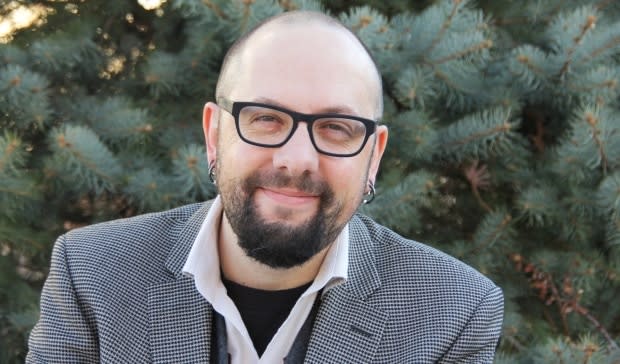Want facts with that? New podcast network dedicated to peer-reviewed academic work
In one episode of his new podcast, Daniel Justice will delve into the world of coyotes — looking at the connections humans have with them, whether it's spiritual or as a pest.
Another episode will take on moss.
Justice, a citizen of the Cherokee Nation and a professor of Critical Indigenous Studies and English at the University of British Columbia, is currently developing Creaturely Conversations.
Each episode will be a deep dive into a particular North American animal and plant species "looking at quirky diversity of ways that these other-than-human beings exist in the world on their own terms but also in the human imaginary."
It's inspired by the Animal Series from Reaktion Books. Justice has written books about badgers and raccoons for the series.
"I had been wanting to do something, a different kind of medium, and I'm a fan of podcasts," he said, adding he wasn't quite sure what the topic should be.
"There's some really amazing Indigenous studies podcasts out there, and I really wanted to see where a podcast might take me. Now, of course, the podcasts are going to include Indigenous context and we're going to have quite a bit of discussion about Indigenous ways of understanding kinship with the other-than-human."
Justice said he was looking for a new form of scholarship and podcasts seemed fun.
Academics become podcasters
Justice is getting help with creating and promoting the podcast through a new joint project from Simon Fraser University in B.C. and Wilfrid Laurier University Press in Waterloo, Ont.
It's called Amplifly, and it gives support for academics who want to share their research in podcast format. This involves not only helping them understand the equipment they need, but also how to tell a story over a number of episodes and finally, how to get those podcasts to listeners. The podcasts will also be peer-reviewed, ensuring accuracy.
Lisa Quinn, the director of Wilfrid Laurier Press, said book editors can really help with the story development of a podcast, which will be very different than a lecture or journal article academics might be used to producing.
"So how do you tell a story? How do you tell a sustained story through a serial form in the form of a podcast? And that's a place where the traditional work of book editors really becomes able to make a contribution," she said.
"This has been one of the major challenges of science communication, how do you tell that story to the broadest possible audience? How do you tell that story to other scholars? In order to do that, you really need to have that focus on the narrative."
Attracting an audience
Getting podcasts in front of the right listeners can be a huge challenge.
Bree Rody is editor of the trade publication Media in Canada. She says the podcast scene is saturated. In part because it's easy for anyone to make and post a podcast.
News and business podcasts are seeing a boost in popularity lately, Rody says, and she thinks academic podcasts could do well.
"There's potential and there's a growth area there, but the discoverability is a huge hump that I think a lot of podcasters are still trying to figure out," Rody said.
Jeff Vidler agrees that will be a large challenge. He's the founder of Signal Hill Insights, which reports regularly on podcasts and Canadian audiences.
"There's a very low barrier to entry to podcasts but there's actually a very high barrier to entry to success," Vidler said.
He said the Amplify project is a "different take" on podcasts and could find an audience once people know what it offers.
"The primary motivation for people to listen to podcasts is to learn something new," he said, adding people also want to be entertained. It's why podcasts such as This American Life are so successful. The podcast is journalism-based and weaves accessible stories with insights about American life.
Vidler says the podcasts will be a chance for academics to really take hold of their narrative. While not all academics will have the success of scientist Bill Nye or astrophysicist Neil deGrasse Tyson, this could be an opportunity to find interesting, new voices.
"There's probably a bunch of Neil deGrasse Tysons that haven't had the opportunity or someone hasn't shown them the way to do that right," he said.

Need for trustworthy information
Quinn says they hope to work with librarians to get the podcasts into the ears of interested listeners. They plan to launch the first podcasts early in 2021.
"There's so much out there. We live in an age of information hyper abundance, so how do you know where to find robustly, researched, vetted, well-developed content? This network aims to try to provide some of that, not only production support, and editorial development support, but that curatorial function," she said.
"There's a lot of focus right now in the scholarly environment on knowledge mobilization, on communicating with the broadest possible audiences. I think our current political circumstances really demonstrate the need for strongly researched, trustworthy information."
Justice says he's working on a detailed plan right now for each episode of the podcast. Amplify is helping him work on the storytelling aspect, and he's excited to see what people make of the topics.
"Podcasts aren't books, and I'm used to writing books, and so what does the podcast structure do that a book wouldn't be able to do," he said of learning a new medium.
"We could have some really great conversations about a world that is often underappreciated and help bring listeners understanding to the complexity of all of these different species and maybe just have a bit more thoughtfulness about the other-than-human world that they are in relationship with," he said.

